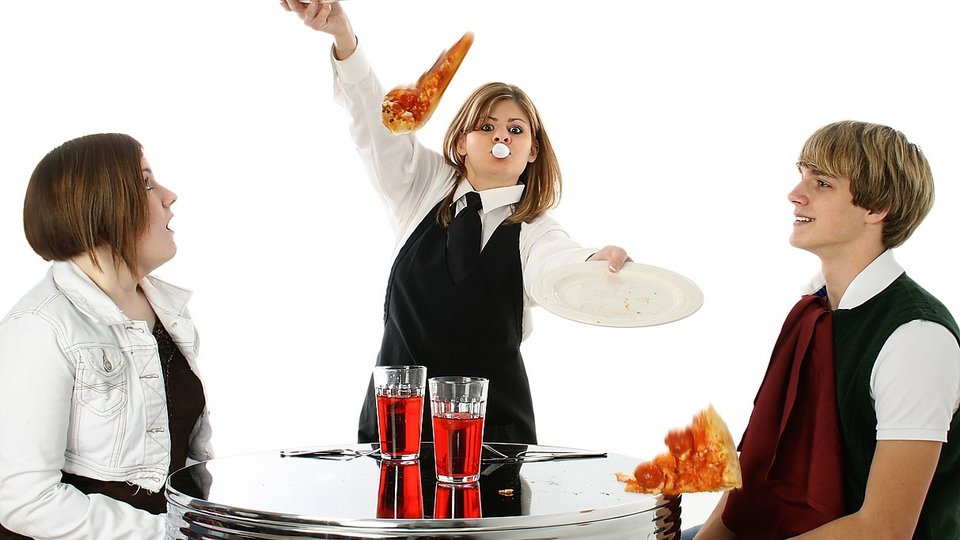Food & Beverage
Blaze, Cousins, Torchy's, &Pizza, Slim Chickens CEOs: 'Chaos is the new normal'
In this recent Fast Casual Executive Summit roundtable, &pizza Co-founder and CEO Michael Lastoria, Blaze Pizza CEO Mandy Shaw, Cousins Subs CEO Christine Specht, Slim Chickens Co-founder and CEO Tom Gordon and Torchy's Tacos CEO G.J. Hart discussed how things have changed and why it's not going to end any time soon.

November 12, 2020 by S.A. Whitehead — Food Editor, Net World Media Group
If you buy into the notion that true business growth can be uncomfortable, then it would not be a stretch to say that for the restaurant industry, this year has been like hitting puberty: painful, but as it turns out, necessary for the industry to reach the next level.
That was among the chief takeaways from five restaurant industry CEOs during this year's Fast Casual Executive Summit CEO Roundtable.
Although they admitted that their brands had been buffeted around on the rocks of COVID-19, they ultimately snapped to it and made the necessary changes to put them on the course for much more pleasurable waters ahead. The keys were flexibility, adaptability and decisiveness at every level of their organizations, always with the contactless experience-seeking customer in mind.
 |
| Shown, left to right are Tom Gordon, G.J. Hart, Michael Lastoria, Mandy Shaw and Christine Specht. |
The panel — moderated by Ryan Wuerch, founder and CEO of the cashback platform, Dosh — included a passionate discussion of the last year's restaurant business by:
- &pizza co-founder and CEO Michael Lastoria.
- Blaze Pizza CEO Mandy Shaw.
- Cousins Subs CEO Christine Specht.
- Slim Chickens co-founder and CEO Tom Gordon.
- Torchy's Tacos CEO G.J. Hart.
Wuerch got the hour-long virtual session going by starting at the top, asking the speakers what leadership characteristics mattered most.
For Torchy's Tacos CEO G.J. Hart, it was the need for leadership transparency that led the list of 2020 imperatives for the 83-location taco chain.
"The most important thing is to be upfront — to be transparent … because what you find is when there is uncertainty — like there is going on with COVID, especially those first weeks — people were scared," he told the group. "So getting out in front of it and communicating the brutal facts of what you're dealing with and the challenges ahead is critical."
But Hart underscored that transparency is not just a one-and-done demand that leadership need only display during times of crisis. Rather, he said leaders must have done the hard work of laying a solid foundation of trust between themselves and their employees.
"The half-life of everything is shrinking. It's not going to stop. … But I don't know that there is just one model. … We're all blurring the lines of a lifestyle brand. … The new normal is change."
-Mandy Shaw/Blaze Pizza
At Slim Chickens, CEO Tom Gordon picked up on the importance of trust and transparency in tough situations but added that effective leaders must also be ready to act decisively. Those who wait to make well-communicated decisions for their organizations invite pandemonium from employees who are left essentially groping in the dark.
"Paralysis because of fear never helped anybody," he said. "Like we made some pretty aggressive moves and tried to get out in front of (pandemic issues). … Like in late March, we slashed 170 basis points out of royalty stream to give franchisees a break. … Then my CMO came in my office on March 23 and said, 'I'm looking at a media drop and I want to go buy it all for the franchisees and I need a half-million dollars today.'
"That was very scary thing on March 23, as we were trying to think about what we could and couldn't do. … But that decisive action was critically important."
The fruits of their labor
Restaurant leaders, not unlike the five involved in this candid discussion, had been used to allowing a fairly lengthy timetable to see the results of their efforts bear fruit. The pandemic, however, changed that, exponentially speeding the time from action to result. These leaders did not feel that was something that would soon change or slow down.
In fact, a lot of those on the panel had been seeing their pandemic-era initiatives — even those that involve major organizational shifts — transform the way they do business already, quite often in very positive ways.
"As a human being, it's very rare to have a moment in time where you actually live your belief system while you've got the proverbial gun to the head," &pizza CEO Michael Lastoria said. "I think what this allowed a lot of brands to do is actually prove we know how to live our values.
"Nothing is more important culturally than being put to the test and now there's a cultural connectedness that didn't exist before."
"Our entire company — everyone has my text number, and I'm constantly texting. … People get tired of seeing my face, but over-communication is a very important thing and I'm constantly going on answering questions and providing color into why the company is making the decisions it's making. And the cherry on top of all this is… it leads to people being really stoked about the brand and it led to investment capital."
-Michael Lastoria/&pizza
For &pizza as an organization, the pandemic also proved leadership's early-on belief that technology is a major part of keeping those connections strong, along with the brand itself.
"Everything we've built into our pizza shops … was waiting for this moment. … " Lastoria said. "So what are we going to do with this newfound adoption of technology? … We're really seeing how we can learn from each other. …
"Our entire company — everyone has my text number, and I'm constantly texting. … People get tired of seeing my face, but over-communication is a very important thing and I'm constantly going on answering questions and providing color into why the company is making the decisions it's making. And the cherry on top of all this is… it leads to people being really stoked about the brand and it led to investment capital. … So, I'm really stoked we're going to do amazing things and really transform things for the better."
Blaze Pizza CEO Mandy Shaw was on the same page with those thoughts, saying that the pandemic provided a real-life test of brand connectivity with the world around it.
"There's great validation right now for authenticity. Right?" she said. "So it's, 'I'm not just trying to sell you stuff, I actually care about you.'"
One of the ways that authenticity became reality at Blaze was with its annual celebration of Pi Day, the recognition of the mathematical constant of 3.14, celebrated on March 14. This year, of course, it t when the pandemic was shutting restaurants.
It's usually a big day for Blaze, so it was left with mounds of fresh mozzarella with no place to go except potentially the waste heap.
"So we donated 1,800 pounds," Shaw said. "And it's harder to donate food than you think in this country. So once we figured out where some of those hurdles were we were okay. … And then we were going to give it to our guests, too, so we just said for everybody that orders a pizza, have a Caprese salad on us. It's part of being there with you. … If you operate in an authentic way it shows that you care."
The technology imperative
At Wisconsin-based, Cousins Subs, CEO Christine Specht said the brand went from zero-to-100 with its tech in a manner that saved what was largely a dine-in brand, pre-pandemic. Fortunately, Specht said the company had recently updated to a systemwide POS across all of its nearly 100 restaurants.
"Little did we know what a help that would be during the pandemic," she said. "Having a unified POS allowed us to do things … like curbside pickup … very quickly. And we wanted to open up every avenue possible, so curbside was launched in remarkable amount of time. … Plus we had been working with delivery providers and we launched free delivery week … to say, 'We hear you. We know you're suffering and we're here to offset that as best we can.' …
"And I think there's going to be shifts in real estate selection. … Our clear performers were the stores with drive-thru … so this really highlights for us, to have more drive-thrus."
At Torchy's — as the conversation shifted to the "new normal" going forward — G.J. Hart took that drive-thru idea a step further by calling attention to the industry's increasing reliance on off-premise, which he said would have greater emphasis in Slim Chickens' future.
"We put in pickup spots … and I don't think anyway of that goes away," Gordon said. "Now we're building restaurants with dedicated pickup spots, a dedicated drive-thru area … and just designing ways that answer how you make it easier for guest to have less friction."
Chaos: The new normal?
Clearly evident from all these organizations is that everything about restaurants and their customers is not only dramatically changing, but doing so at an ever-faster rate. Shaw said that meant restaurant industry survivors would be those brands that exhibit the most agility and willingness to turn-on-a-dime as the business morphs into whatever ultimately becomes the new normal.
"The half-life of everything is shrinking," she said. "It's not going to stop. … But I don't know that there is just one model … if you're driven by the consumer on a day-to-day basis. … We're all blurring the lines of a lifestyle brand. … the new normal is change."
The sentiment was met with lots of head-nodding from this group of pandemic-worn leaders. In fact, Lastoria even took the idea a step further, saying that if there is a new normal, it's chaos.
"We have to think about restricting our G&A so that we can structure around the chaos," he said. "The digital shop is as important as the physical shop … but we all have to do it and we all have to get really good at it."
Editor's Note:Want to listen to the entire hourlong session from this year's virtual Fast Casual Executive Summit? Just click here to enjoy a replay of the session.
About S.A. Whitehead
Pizza Marketplace and QSRweb editor Shelly Whitehead is a former newspaper and TV reporter with an affinity for telling stories about the people and innovative thinking behind great brands.
 ChatGPT
ChatGPT Grok
Grok Perplexity
Perplexity Claude
Claude





